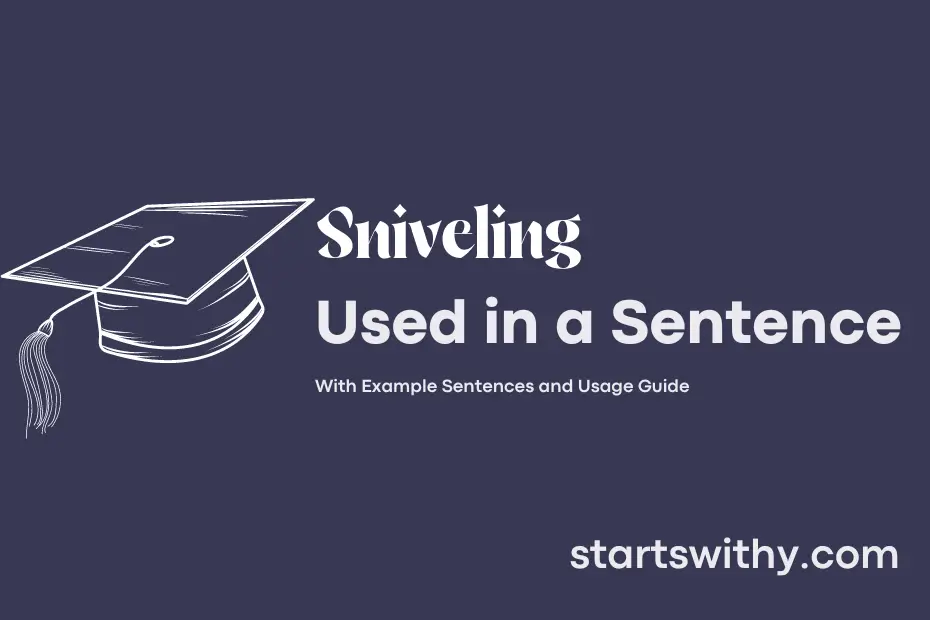Do you know what it means when someone is sniveling? The word “sniveling” describes a person who is whining, complaining, or crying in a weak or irritating manner.
In a sentence, someone who is sniveling might be seen as annoying or pitiful by others.
7 Examples Of Sniveling Used In a Sentence For Kids
- Sniveling is when you cry a lot and make lots of tears.
- Don’t be sniveling if you drop your toy, just pick it up and keep playing.
- It’s okay to feel sad, but sniveling won’t solve the problem.
- Sometimes when we have a cold, we may end up sniveling a lot.
- If you feel like sniveling, you can talk to a friend or a teacher about it.
- Remember, it’s okay to be upset, but too much sniveling can make us feel worse.
- Instead of sniveling, we can take deep breaths and calm down.
14 Sentences with Sniveling Examples
- Sniveling over a bad grade won’t change it, take the feedback and learn from your mistakes.
- It’s important to be strong and confident during presentations, no room for sniveling in front of the class.
- Group projects can be tough, but it’s essential to communicate openly and avoid sniveling about your teammates’ work.
- If you’re feeling overwhelmed with assignments, don’t waste time sniveling – reach out to your professors for help.
- Networking events are a great opportunity to meet new people and build connections, so no room for sniveling about social anxiety.
- It’s normal to feel nervous before exams, but sniveling about it won’t help – focus on your preparation instead.
- Sniveling to your friends about your workload won’t make it go away, prioritize your tasks and stay organized.
- College can be challenging, but sniveling about the difficulties won’t make them disappear – seek support and stay resilient.
- Avoid sniveling about missed opportunities, reflect on what you could have done differently and use it as a learning experience.
- When facing a disagreement with a classmate, it’s important to address it directly and constructively, rather than sniveling about it behind their back.
- Sniveling about comparing yourself to others is a waste of time, focus on your own growth and progress instead.
- Being proactive in seeking internships and job opportunities will serve you better than sniveling about the lack of opportunities available.
- It’s natural to feel homesick at times, but sniveling about it won’t make the feeling go away – stay connected with your loved ones and build a support system.
- Instead of sniveling about the challenges of balancing academics and extracurricular activities, work on improving your time management skills.
How To Use Sniveling in Sentences?
Sniveling means to cry and sniffle in a feeble or fretful way, often because someone is complaining or feeling sorry for themselves. To use this word effectively in a sentence, follow these steps:
-
Determine the context: Think about a situation where someone is whining, complaining, or feeling sorry for themselves. For example, “He was sniveling about his lost wallet.”
-
Identify the subject: Decide who is doing the sniveling in your sentence. It could be a person, animal, or even an object. For instance, “The toddler started sniveling when she dropped her ice cream.”
-
Choose the right verb tense: Depending on when the sniveling occurred, use the appropriate verb tense. For example, “She was sniveling all day after failing the test.”
-
Complete the sentence: Add any additional information or details to complete the sentence. For instance, “The customer began sniveling when her order took too long to arrive.”
Remember, when using the word sniveling, try to convey a sense of annoyance, frustration, or weakness in the way the crying or complaining is being done. Practice using this word in different sentences to become more comfortable incorporating it into your vocabulary.
Conclusion
In conclusion, the use of “sniveling” in sentences conveys a sense of weakness, vulnerability, or undesirable behavior in individuals. These sentences often depict someone as whiny, cowardly, or emotionally manipulative, eliciting a negative image of the person described. Whether it is used to describe a character in a story, an attitude, or an action, the word “sniveling” paints a clear picture of someone who is lacking in strength or dignity.
Overall, sentences with “sniveling” serve to highlight traits or behaviors that are often seen as unappealing or unsympathetic. The word effectively captures a certain type of behavior that may evoke feelings of annoyance, disdain, or pity in others. The use of “sniveling” in sentences helps to create vivid descriptions that evoke strong reactions and provide insight into the character or behavior being described.



